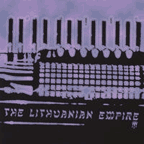The Lithuanian Empire
Review by Keith Wolzinger
 The Lithuanian Empire, 2006
The Lithuanian Empire, 2006
available from the band's website,
www.the lithuanian empire.com
I love it when a fresh new sound comes along. The thing is that The Lithuanian Empire starts with traditional Klezmer as its basis. This is evident in the opening and closing acapella Nigunim that frame the rest of this thoroughly entertaining album. From there we are taken on a musical journey that I can only describe as North American-influenced Eastern European music. There is a balance to this music that keeps the listener engaged throughout the album. Each song has its own twist on the musical tapestry. From high energy klezmer/balkan/gypsy to jazz influences, as well as classical, punk, and rock, all are carried off in a very hip way.
The first instrumental, "Ol' Daddy Sizzlegut," sets the stage for the rest of the album. A high energy Klezmer tune that is thoroughly enjoyable, it features each band member along the way.
"Balkan Balebusteh" is a slightly different Balkan-style tune. Balkan music seems to have become quite popular in recent years, and these tunes are making their way into the Klezmer conciousness. This is a fine example of the genre, with a 7/4 time signature in a 4-3 pattern. It has a definite groove that grabs you and takes you along for a fast-paced ride. Check out the great contemporory drumming by Lorie Wolf.
"Cherry Blossom Hora" is one of three compositions by band member Andy John. This seemingly Japanese-influenced medium-tempo Hora features John on Harmonica. Being familiar with Klezmer harmonica by the band Shtreiml, I have come to appreciate the texture that the instrument brings to the table.
"Eva's Tune," I think, represents one of the cornerstones of The Lithuanian Empire's musical language. After a percussion intro by Wolf, the trumpet comes in with the melody, followed by clarinet and accordion, then the entire band, in a straightforward 7/4 Balkan tune. But then the band drops out, leaving just the piano, bass, and drums. The trio leaps into a free-form jazz section that is completely unexpected, yet is a truly great performance on its own. I would like it in any context, but it adds a new dimension to this piece. (It just shows you that you never can predict what TLE will do next!) The accordion joins in, then the band joins in, clapping the Balkan rhythm. Finally all of the instruments join in for the coda.
"Tisch Nign II" is a solo piece performed by pianist Fern Lindzon. This is a delicate piece that is difficult to categorize, but I suppose it could be called a Comtemporary Doina. Don't worry about what I call it, just listen and be moved.
"Yismekhusidl," an arrangement of a Klezmer tune by Trombonist Ryan Purchase is another example of TLE's way of doing business. Just as we get comfortable listening to the great traditional groove set by the clarinets, the piece takes a turn into a funk groove with some very nice jazz comp chords by the piano. As the piece continues, more rock backgrounds are added by the Bass and Trombone. Then we take another turn into a Led-Zeppelin style funk groove with John taking a Sitar-style solo on electric guitar. Another case of something unexpected, but it works well in this context.
"aSHERville" is a duet composed by John, as a play on words between the song style and his hometown. Playing Harmonica again and joined by Wolf on Drums, this is a short piece that alternates between a Bluegrass style and a Bulgar. It is full of energy and shows yet another facet of TLE's versatility.
"Devorah Nign" is an original by Purchase and arranged for Clarinet, Trombone, and Piano. This is a lovely, delicate arrangement, and brings in a chamber music quality, thanks to Purchase's classical composition background. No switching styles here, TLE let this one stand on its own.
"Sushi For Shabbes," the last instrumental, continues the Japanese thread with a latin-influenced Klezmer song, featuring solos by Clarinet, Piano, and Accordion. Check out the great Bass lines here!
The Lithuanian Empire is fast becoming one of my favorite groups/albums. Their love of traditional music is evident, as is their desire to incorporate many other musical elements. To some, it may seem to be a mash-up. But there is authenticity in each element that's mixed in, from jazz to Balkan to funk to classical. It all works. I think that this is where Jewish music is headed and I'm all for it. Long live the Empire!
To hear my interview with The Lithuanian Empire, listen to Klezmer Podcast 22.
Reviewed by Keith Wolzinger, 20 Nov, 2007.
Personnel this recording:
Kinneret Sagee: clarinet (Tracks
1-5,7,9-11)
Becky Wexler: clarinet (Tracks 1-5,7,10,11)
Lorie Wolf: drums and percussion (Tracks
1-5,7,8,10,11)
Ryan Purchase: trombone (Tracks
2-5,7,9,10,11)
Fern Lindzon: piano, keyboard (Tracks
1-5,7,9,10,11)
Andy John: bass, guitar, harmonica, electric sitar (Tracks
2-5,7,8,10,11)
Eva Boodman: trumpet (Tracks 1-5,7,10,11)
Randel Pierce: accordian, piano (Tracks
2,3,5,7,10,11)
Guest:
Moti Ludmer: accordian (track 4)
- Tisch Nign (R. Wexler) 1:17
- Ol' Daddy Sizzlegut (Trad) 3:26
- Balkan Balebusteh (Trad) 3:33
- Cherry Blossom Hora (A. John) 5:39
- Eva's Tune (Trad) 4:22
- Tisch Nign II (R. Wexler) 2:47
- Yismekhusidl (Trad) 4:56
- aSHERville (A. John) 1:19
- Devorah Nign (R. Purchase) 3:32
- Sushi for Shabbes (A. John) 5:28
- Tisch Nign III (R. Wexler) 2:15

